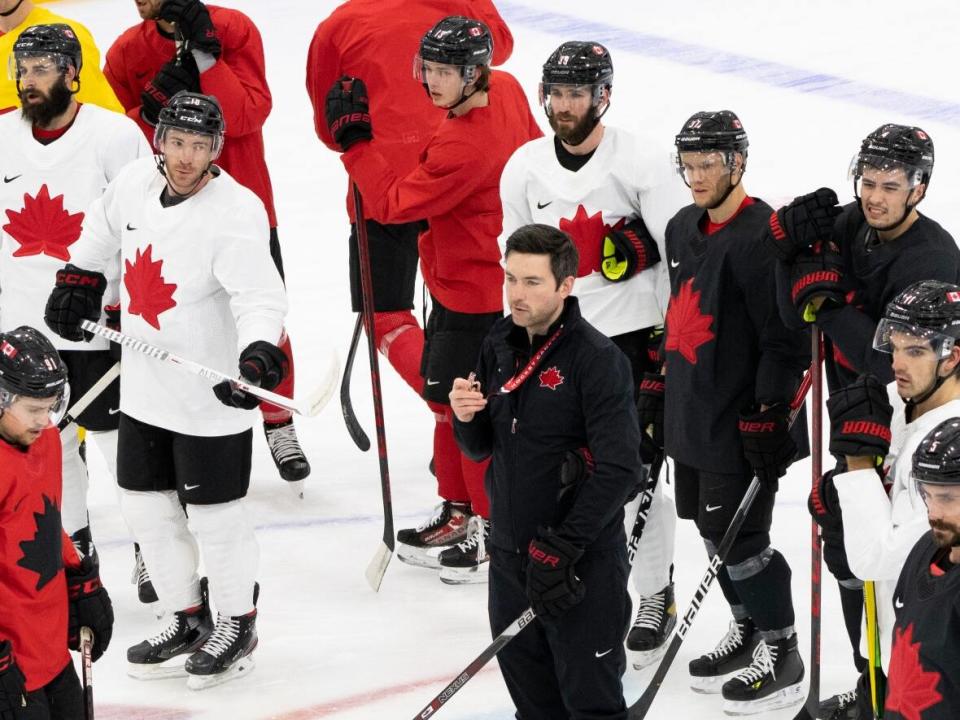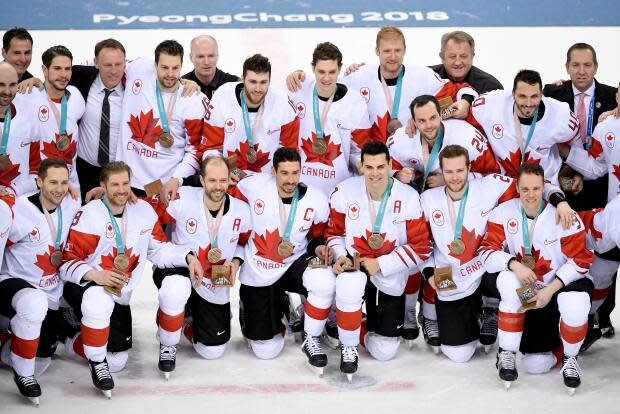Canadian men's hockey team aims to contend with blend of youth and experience

In the aftermath of the National Hockey League opting out of the Beijing Winter Games, the medal-contending nations took distinctly different approaches to roster construction.
Finland opted for team chemistry and veteran experience, selecting 18 players from the Kontinental Hockey League and nine from the squad that won the 2019 world championship. Similarly, Czechia general manager Petr Nedved cobbled together a battle-scarred line-up featuring David Krejci, 35, and Michael Frolik, 33.
The Americans swung the other way entirely, naming 15 youngsters from the college ranks to Team USA.
And Canada? Well, general manager Shane Doan barrelled right up the middle, opting for a combination of aging veterans, fresh-faced rookies and those in the prime of their careers.
WATCH | Canada takes balanced approach to roster construction:
We'll find out which strategy works starting Wednesday when the puck drops between Switzerland and the Russian Olympic Committee to open the preliminary round.
With the threat of positive COVID-19 tests hanging over every nation, Canada plays its first game Thursday against Germany.
"We're going to have to see with the other teams, with the whole COVID situation, who actually gets to show up and play," Team Canada alternate captain Maxim Noreau said. "Having played at the last Olympics and many Spengler Cups, I know Canada is always going to be one of the favourites."
In truth, the betting odds for gold swung from Canada to Russia on Dec. 22 when the NHL announced its players would not participate due to game cancellations caused by COVID-19. But Canada remains a legitimate podium threat along with Russia, Sweden, Finland, Czechia and the United States.
In 2018, the Russians won gold, Germany silver and Canada bronze at the non-NHL PyeongChang Winter Olympics. This time around, the tournament is being held on the smaller NHL-sized ice, which, in theory, favours Canada and the U.S.

"There is always pressure when you put on the Maple Leaf," Noreau said. "But I think it's a privilege to have that pressure.
"We're going for gold. We can't be scared to say that we want to win."
For Canada to win, production is crucial from the top line of Mason McTavish, captain Eric Staal and Josh Ho-Sang – especially given the offensive firepower possessed by the Russians and Americans.
McTavish just turned 19, but the third-overall pick of the Anaheim Ducks is already a bruising forechecker with quick hands who doesn't shy away from heavy traffic.
At 37, Staal is in the twilight of his career. But the Carolina Hurricane legend can clearly still score, having collected two goals and five points in a recent American Hockey League conditioning stint.
Ho-Sang, a Toronto Maple Leafs prospect playing for the AHL Marlies, completes the No. 1 trio as a top offensive threat on the wing.
"He's a guy that obviously has an incredible amount of skill, somebody that can get around the ice," Doan said of Ho-Sang. "When you watch him move, and you watch him handle the puck and do the things he does — not a lot of the people in the world can do that."
Another offensive weapon for Canada is centre Corban Knight, the third-leading scorer in the KHL with 48 points in 47 games for Avangard Omsk.
On defence, expect to see a lot of Owen Power, a first overall pick of the Buffalo Sabres. Like McTavish, Power is only 19, but he's already widely considered the best skater in the world not playing in the NHL.
In Monday's team scrimmage against the U.S., Power was paired up with veteran Mat Robinson, who won bronze with Canada in 2018.
Mark Barberio (272 NHL games) and Jason Demers (699 NHL games) also bring experience and savvy to the hulking Canadian blue line.

Experience aside, defensive miscues are likely, especially given the team's brief time to get to know one another.
"I think the biggest thing is to not over-complicate our lives, to try and get pucks moving north and to break up plays defensively," Barberio said. "I think that's just the staple of Canadian hockey — just being hard to play against, and we're just going to continue that tradition."
Traditionally, Canada is blessed with star power in goal. But this time around, veteran netminders Eddie Pasquale and Matt Tomkins are not exactly household names.
In spite of his inexperience, Northeastern University product Devon Levi is arguably the best known of the group. A star with Canada's 2021 world junior team, Levi has a spectacular 1.55 goals against-average, a .948 save percentage and nine shutouts this season in the NCAA.
But Levi, 20, was in street clothes for Monday's scrimmage against the U.S. — not something you'd expect if head coach Jeremy Colliton planned to start the youngster against Germany.
Through it all, win or lose, Staal is expected to lead by example and inject calm into the lineup.
"I hope to make new memories again this year," said Staal, who won gold with Team Canada at the 2010 Vancouver Olympics. "It's such a unique time and special event where you get everyone together and try and build a team really quickly.
"To be able to accomplish that is special."

 Yahoo Sports
Yahoo Sports 